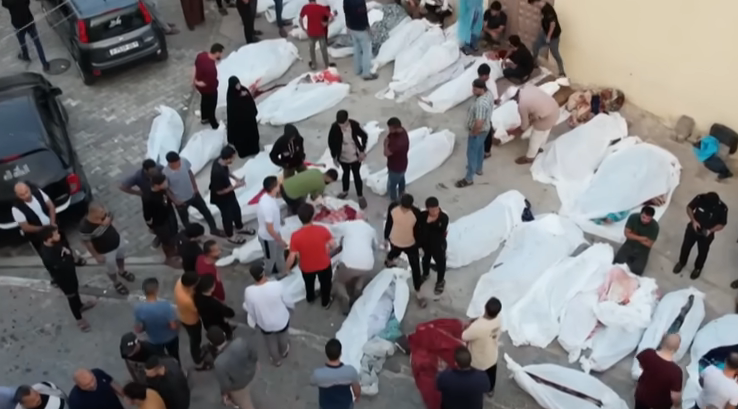Photos: YouTube Screenshots
(Jerusalem) – Civilians were targeted, attacked, abused, and killed over the past year at a scale unprecedented in the recent history of Israel and Palestine, Human Rights Watch said Thursday in releasing its World Report 2024.

More than 1,200 Israelis and foreign nationals in Israel and, as of January 4, more than 22,000 Palestinians in Gaza, the majority of them civilians, have been killed since October 7, 2023, according to local authorities, amid hostilities between Israeli forces and Palestinian armed groups in Gaza that have included unlawful attacks and other grave abuses. Meanwhile, killings, administrative detention, and settler violence against Palestinians in the occupied West Bank reached years-long highs.
“The heinous crimes carried out by Israeli forces and Palestinian armed groups since October 7 are the abhorrent legacy of decades-long impunity for unlawful attacks and Israel’s systematic repression of Palestinians,” said Omar Shakir, Israel and Palestine director at Human Rights Watch. “How many more civilians must suffer or be killed as a result of war crimes before countries supplying weapons pull the plug and otherwise take action to end these atrocities?”
In the 740-page World Report 2024, its 34th edition, Human Rights Watch reviews human rights practices in more than 100 countries. In her introductory essay, Executive Director Tirana Hassan says that 2023 was a consequential year not only for human rights suppression and wartime atrocities but also for selective government outrage and transactional diplomacy that carried profound costs for the rights of those not in on the deal. But she says there were also signs of hope, showing the possibility of a different path, and calls on governments to consistently uphold their human rights obligations.
On October 7, Hamas-led gunmen from the Gaza Strip carried out an attack in southern Israel, deliberately killing civilians, firing into crowds and gunning people down in their homes, and taking hostages back to Gaza, including older people and children, acts that amount to war crimes. About 128 people were still held hostage as of January 2, according to Israeli authorities.
Shortly thereafter, Israeli authorities cut off essential services, including water and electricity, to Gaza’s population and blocked the entry of all but a trickle of fuel and critical humanitarian aid, acts of collective punishment that amount to war crimes and include the use of starvation as a method of warfare. Israeli air strikes have incessantly pounded Gaza, hitting schools and hospitals and reducing large parts of neighborhoods to rubble, including in attacks that were apparently unlawful. Israeli forces also unlawfully used white phosphorous in densely populated areas. They ordered the evacuation of everyone in northern Gaza and had displaced an estimated 85 percent of Gaza’s population—1.9 million people—as of January 2.

The blockade exacerbated the humanitarian situation stemming from Israel’s 16-year-long sweeping restrictions on the movement of people and goods into and out of Gaza. The prolonged closure, as well as Egyptian restrictions on its border with Gaza, has deprived the 2.2 million Palestinians of Gaza, with rare exceptions, of their right to freedom of movement and opportunities to better their lives; severely limited their access to electricity, health care, and water; and devastated the economy.
In the West Bank, Israeli forces in 2023 killed 492 Palestinians, including 120 children, according to the United Nations Office for the Coordination of Humanitarian Affairs (OCHA), more than twice as many as in any other year since 2005, when the UN began systematically recording fatalities. This includes unlawful killings stemming from Israel’s regular use of excessive lethal force and some cases of extrajudicial executions.
As of January 1, Israeli authorities also held 3,291 Palestinians in administrative detention, without charge or trial, based on secret information, according to Israeli Prison Services figures. This figure marks a three-decade high, according to the Israeli human rights group HaMoked.
During the first half of 2023, the Israeli government approved building 12,855 new housing units in Israeli settlements in the occupied West Bank, the highest number the Israeli group Peace Now, which has been systematically tracking plans since 2012, has ever recorded. The transfer of civilians into occupied territory is a war crime.
During the first eight months of 2023, incidents of settler violence against Palestinians and their property reached their highest daily average since the UN started recording this data in 2006; an average of three incidents a day, compared with two a day in 2022 and one in 2021. That rate further increased after October 7. OCHA recorded 1,227 incidents of settler violence in 2023 that resulted in casualties and/or property damage, more than in any year since it started recording incidents involving settlers in 2006.
Israeli authorities’ repression of Palestinians, undertaken as part of a policy to maintain the domination of Jewish Israelis over Palestinians, amount to the crimes against humanity of apartheid and persecution.








